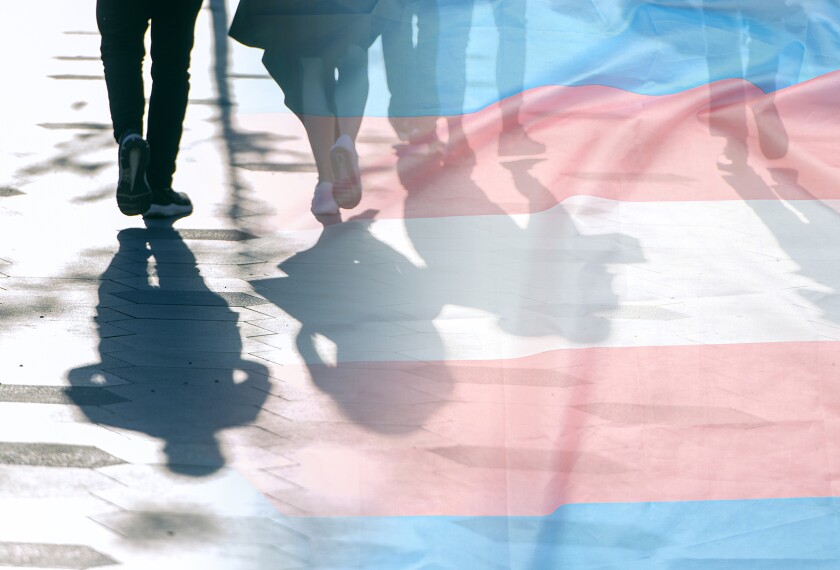Beep! Beep! Beep! 0.236 seconds before the fourth beep goes off, the phone’s alarm screen goes dark. Some students are known to sleep through alarm clocks, but this student has their own special alarm, school anxiety. For them, school is like navigating a minefield. The student constantly wonders, “what sort of people are safe to talk to, what is safe to wear, if other people are looking at them, will they get be threatened for being themselves or which restroom do others want them to use?” This student is transgender, meaning that they don’t identify as the gender they were assigned at birth. It also means they actively grapple with discrimination and self-doubt throughout the day, while others often refer to them with subtle animosity and frustration.
“I keep myself on a technical down low when it comes to my trans identity,” Parker Chavez (12) said. “When I realized I was trans I found that my relationship with school became harder to navigate because I was under the stress of grades along with figuring out what I truly was and thinking of how I would come out to others or the changes that would come with it.”
According to the National Sexual Violence Resource Center, transgender students in grades K-12 are at high risks of being targets of violence, with 78% reporting harassment, 35% physical assault, and 12% sexual violence.
“Being trans made me more confident to be myself around other people but it’s not the easiest thing in the world when you first come out,” Lou Glazner (10) said. “It gave me a lot of anxiety and hesitancy to be fully open around certain people out of fear that there’ll be a slur thrown out.”
In 2023, according to Trans Legislation Tracker, 604 anti-trans bills were introduced. Around one third are aimed at educational settings which deny students the ability to choose their names, expose them as being trans to their potentially unaccepting parents, and censor transgender perspectives in education. Stifling trans voices contributes to the discrimination. According to Gay Lesbian and Straight Education Network (GLSEN), LGBTQ students in schools with an inclusive curriculum experience a lower level of discrimination and were less likely to miss school because they felt unsafe. Students also report that their peers were more accepting of the LGBTQ community when an inclusive curriculum is introduced.
“I recall I was sitting at lunch and the people around me were talking about those who go by they/them pronouns and how it frustrated them,” Chavez said. “I don’t even try to correct others, and that likely says a lot about how I’ve been treated as a trans individual.”
According to the LGBTQ crisis center, “The Trevor Project,” when LGBTQ students feel that their teachers cared about them, they had 34% lower odds of attempting suicide. Opposingly, while 29% of cisgender girls, girls who aren’t transgender, felt that their teachers cared about them, only 4% of transgender girls felt cared about. According to the CDC, approximately 25% of transgender students skip school because they feel unsafe.
“It’s so difficult to be openly trans these days,” Aida Grady (10) said. “At the same time I’ve met some really great and accepting students and teachers here.”
Small gestures can go a long way. According to the Journal of Adolescent Health, over 70% of trans teens reported feeling less depressed when they are allowed use to their chosen names at school, home, and with friends.
“All I can ask is that everybody accepts others for who they are,” Grady said. “I found myself surrounded with more accepting friends and teachers as I started to figure out my identity.”
While some students have good experiences with teachers, others may not be so lucky, which makes some students think about who they should be open to.
“There is one substitute teacher who has made some transphobic comments about one of my friends who used to go here,” Glazner said. “My friend told the teacher that he was trans and the next day he overheard the teacher saying ‘don’t talk to her, she has issues.’”
According to the Journal of Child and Adolescent Psychiatric Nursing, trans students who attended social support groups were more likely to feel satisfied and happy in life. Other options are available too, like online communities.
“Things start to get easy when you have a group of awesome friends who accept you,” Glazner said. “We need more people calling out transphobia to show trans people that there’s others who support them.”
Trans students express that there could be small changes done to the school to make trans students feel safer, suggesting things like occasional mental health check-ins, more privacy in restrooms, and social support systems to build a more inclusive community. Support counselors are available to all students, more details can be found by going to the Creek Corner Canvas page.





















